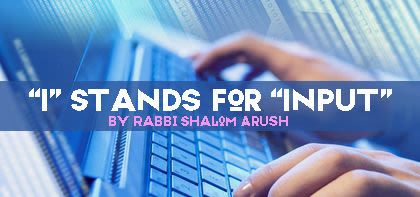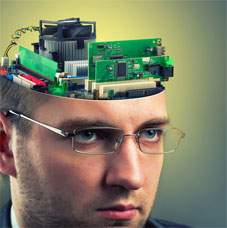
“I” Stands for “Input”
People are bewildered, confused, disoriented and depressed because they don't know themselves. It's certainly frustrating not to know who you are...

Translated by Rabbi Lazer Brody
The concept of the “identity crisis” is all too common today. People are bewildered, confused, disoriented and depressed because they don't know themselves. It's certainly frustrating not to know who you are. Even more, they spend countless hours and dollars trying to find out who they are.
Why all the bother? It's amazingly simple to know who you are.
Logically, “I” stands for “input”. A person is his or her thoughts. Our thoughts are in the brain. In that respect, a person is the input that he downloads to his brain, for this input is the source of his or her thoughts.
 We can readily understand the above concept by comparing the human brain to the hard drive of a computer. Three different people can purchase the same basic model of a Mac or a PC. One is a graphics designer who loads the computer with the latest version of PhotoShop. The second is a musician whose computer is loaded with the latest and best music-recording and editing programs. Yet the third is a certified public accountant; his computer is full with all types of tax-and-interest-calculating programs. So, here we have three identical computers, but because of the different programs, or “input”, each is as different from the other as night and day. No one would expect the CPA to do a final mix of ten music tracks on his computer, just as no one would expect the musician to prepare a tax-return on his computer. Each is separate. So as it turns out, the computer is the input – the software, and not the hardware.
We can readily understand the above concept by comparing the human brain to the hard drive of a computer. Three different people can purchase the same basic model of a Mac or a PC. One is a graphics designer who loads the computer with the latest version of PhotoShop. The second is a musician whose computer is loaded with the latest and best music-recording and editing programs. Yet the third is a certified public accountant; his computer is full with all types of tax-and-interest-calculating programs. So, here we have three identical computers, but because of the different programs, or “input”, each is as different from the other as night and day. No one would expect the CPA to do a final mix of ten music tracks on his computer, just as no one would expect the musician to prepare a tax-return on his computer. Each is separate. So as it turns out, the computer is the input – the software, and not the hardware.
The human brain is no different than the computer. The input that we download to our brain determines who we are. Take a professor of physics who devotes his entire life to his particular intellectual discipline; you wouldn't expect him to answer a question about ancient Chinese history. He simply doesn't have the input.
Rebbe Nachman teaches us that good thoughts are the good inclination and evil thoughts are the evil inclination. Keeping in mind the concept that the “I” is the input, we can conclude that sadness, depression, despair and other negative emotions are all the result of the negative input that a person has downloaded to his brain. The opposite holds true as well – happiness, inner peace, love and optimism are the result of the positive input that a person has downloaded to his brain.
Happiness and a positive outlook on life therefore depend downloading as much positive input as possible to the brain, and as little negative input as possible to the brain. We are accordingly behooved to differentiate between positive and negative input.
Negative thoughts, as we learned, are the product of negative input to the brain. This is the source of the evil within us. Somewhere along the line, we enabled negativity to enter our brain. For example, when a person fails to guard his eyes and looks at a woman other than his wife, this image enters his brain. Once it's in the brain, it's part of him. Even though he did nothing other than look, he's now carrying the image of a strange woman in his brain. Our sages said that the mere contemplation of a sin is even worse that the sin itself, for it contaminates the brain. With forbidden input on the brain, a person's evil inclination becomes much stronger. One suffers, especially in the areas of marital peace, income and inner peace. The negativity all started with the negative input to the brain.
Unfortunately, unlike a computer, we can't simple erase negative input from our brains. But, there is a way to neutralize the negative input to the extent where it no longer has any effect on you. We do that by learning Torah intensively. The difference between superficial or casual Torah learning and intensive learning is that the latter has the power to change your life. Therefore, when you learn such books as “The Garden of Emuna”, “The Garden of Wisdom” or “The Garden of Peace” with the intent of implementing everything you learn, this is considered intensive learning.
Intensive learning fills our brains with good thoughts. The more one's brain is filled with good input, the less room there is for negative input. Anger, sadness, depression and anxiety become things of the past. Therefore, don't ever despair. If you so desire, you can change yourself for the better this very moment. Just begin filling your brain with positive input. The results are guaranteed to be wonderful. We can't change others, but we can certainly change ourselves. And, when we uplift ourselves, we uplift our spouses and children too. Everyone benefits. G-d bless for a healthy winter!











Tell us what you think!
Thank you for your comment!
It will be published after approval by the Editor.